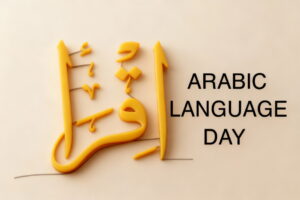
Do You Know that Arabic Has at Least 11 Words for “Love”?
The Arabic language is famous for its poetic depth, and nowhere is this more evident than in the many ways it expresses love. Unlike English, which primarily relies on the single word “love,” Arabic uses multiple layers of vocabulary—each describing a different type, stage, or depth of love.
This blog explores 11 distinct Arabic words for love, each rooted in centuries of Arabic culture, classical literature, and everyday expression. These words reveal the emotional precision of Arabic and why it’s such a powerful language to learn—not just linguistically, but emotionally.
Table of Contents
ToggleWhy Arabic Has So Many Words for Love?
Arabic is a rich, root-based language. One root can generate many words with subtle variations in meaning. This is especially true when talking about love in Arabic. Classical Arabic evolved through poetry, Islamic theology, and tribal traditions, all of which emphasized human emotions—particularly devotion, longing, and loyalty.
Each word for love carries a slightly different emotional weight. For Arabic speakers, using the right word for the right moment is not just poetic—it’s respectful and culturally meaningful.
The 11 Arabic Words for Love (+ Cultural Context)
1. Hawa (هوى)
Literal Meaning: Desire, attraction
Arabic Sentence: هوى القلب سريعًا.
Transliteration: hawā al-qalb sarīʿan
Meaning: The heart fell quickly.
Usage: Refers to the initial stage of falling in love, often physical or impulsive.
2. Ishq (عشق)
Literal Meaning: Passionate love
Arabic Sentence: كان عشقها لا يُوصف.
Transliteration: kāna ʿishquhā lā yūṣaf
Meaning: Her passion was indescribable.
Usage: Represents deep, overwhelming, even obsessive love.
Cultural Note: Historically seen in Sufi poetry, symbolizing spiritual love or divine yearning.
3. Gharam (غرام)
Literal Meaning: Deep romantic attachment
Arabic Sentence: يعيش في غرام دائم.
Transliteration: yaʿīsh fī gharām dāʾim
Meaning: He lives in constant romantic love.
Usage: Often seen in romantic songs or poetry.
4. Mawadda (مودة)
Literal Meaning: Affection, love with kindness
Arabic Sentence: الزواج يحتاج إلى مودة ورحمة.
Transliteration: az-zawāj yaḥtāj ilā mawadda wa raḥma
Meaning: Marriage needs affection and mercy.
Usage: Implies steady, compassionate love, often in long-term relationships.
5. Khulla (خلة)
Literal Meaning: Intimate, loyal companionship
Arabic Sentence: الخلة تأتي من أعماق القلب.
Transliteration: al-khulla taʾtī min aʿmāq al-qalb
Meaning: True companionship comes from deep within the heart.
Usage: Refers to a rare form of love rooted in loyalty and selflessness.
6. Hubb (حب)
Literal Meaning: Love
Root: ح ب ب (ḥ-b-b)
Arabic Sentence: أحبك من كل قلبي.
Transliteration: uḥibbuka min kull qalbī
Meaning: I love you with all my heart.
Usage: Most common Arabic word for love. It’s the foundation of many other words in this list.
7. Shaghaf (شغف)
Literal Meaning: Intense longing
Arabic Sentence: لديها شغف بالموسيقى.
Transliteration: ladayhā shaghaf bil-mūsīqā
Meaning: She has a passion for music.
Usage: Expresses passion for both people and interests.
8. Sabāba (صَبابة)
Literal Meaning: Heartfelt longing, melancholy desire
Arabic Sentence: شعر بصبابة لا تُحتمل.
Transliteration: shaʿara bi-ṣabāba lā tuḥtamal
Meaning: He felt an unbearable yearning.
Usage: Used in classical poetry to describe deep longing or unrequited love.
9. Walaa (وَلاء)
Literal Meaning: Loyalty, emotional allegiance
Arabic Sentence: ولاؤه لعائلته لا يُشك فيه.
Transliteration: walāʾuhu li-ʿāʾilatihi lā yushakk fīh
Meaning: His loyalty to his family is unquestionable.
Usage: Often used in friendships or family settings rather than romantic contexts.
10. Shawq (شَوْق)
Literal Meaning: Longing or yearning
Arabic Sentence: أشعر بشوق كبير إليك.
Transliteration: ashʿur bi-shawq kabīr ilayk
Meaning: I feel a deep longing for you.
Usage: Used when separated from a loved one, expressing emotional distance.
11. Hayam (هَيام)
Literal Meaning: Madness of love
Arabic Sentence: أصيب بهيام لا شفاء منه.
Transliteration: uṣība bi-hayām lā shifāʾ minhu
Meaning: He was afflicted with incurable love madness.
Usage: The most extreme, often tragic form of love.
How to Use These Words Like a Native?
Cultural Do’s and Don’ts
In Arabic culture, words like ʿishq or hayam are reserved for intense emotional conversations or poetry—not casual speech.
Words like hubb, shawq, and mawadda are more commonly used in modern relationships and daily interactions.
Avoid overusing dramatic terms unless you’re speaking poetically or writing.
Jordanian Dialect Twist
In Jordanian Arabic:
- Hubb stays the same but is pronounced ḥobb
- Mawadda becomes more conversational and can imply mutual respect
- Shawq often used with friends or family to say “I miss you”:
مش تاكلني الشوق؟ (mish tākilnī ash-shawq?) – “Doesn’t longing eat at you?”
Learning these words in Jordan gives you exposure to both their classical and everyday use.
Why Learn Love Vocabulary in Jordan?
Jordan is a country where language meets culture every day. In markets, cafés, and even on street signs, you’ll hear Arabic words expressing affection and social warmth.
At AlBaher Language Center, students don’t just learn vocabulary—they learn how to use words in cultural context, including:
- Poetry reading sessions
- Listening to romantic music
- Exploring the emotional layers of Arabic words for love
The emotional depth of Arabic isn’t just in how it’s spoken—it’s in how it’s felt. And there’s no better place to feel it than in Jordan, surrounded by both language and culture.



